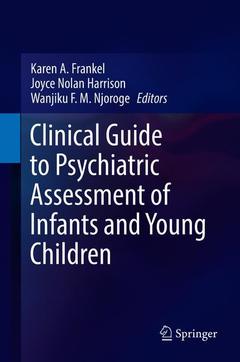Clinical Guide to Psychiatric Assessment of Infants and Young Children, 1st ed. 2019
Coordonnateurs : Frankel Karen A., Harrison Joyce, Njoroge Wanjiku F.M.

This book provides a clinical guide to the psychiatric assessment of infants and young children, birth through five years, and their families. It offers a comprehensive, data-rich framework for conducting mental health assessments of infants, toddlers, and preschoolers. The book includes a step-by-step guide for evaluation and assessment, reviewing relevant literature and best practices for working with very young children. It begins with an overview of the purpose and principles of psychiatric assessment and offers a protocol for planning and executing a thorough evaluation. Chapters examine critical aspects of the assessment process, including children?s relationships with parents/caregivers, assessment of parents, cultural considerations, and play behaviors. Chapters also provide illustrative case vignettes and information on specialized tools that can be adapted for use in a private office or training clinic.
Topics featured in this book include:
- Play-based assessment models for accessing the inner world of young children.
- The effect of caregivers and their reflective functioning on the mental health of young children.
- The use of adult-report rating scales in the clinical assessment of young children.
- Psychopharmacologic considerations in early childhood.
The Clinical Guide to Psychiatric Assessment of Infants and Young Children is a must-have resource for researchers, clinicians, and related professionals, and graduate students in infancy and early childhood development, pediatrics, social work, psychiatry, and public health.
?The volume is both highly practical and up to date, impressively bridging the gap between science and practice. The book is an invaluable guide for students and trainees and an important reference for seasoned clinicians.?
David Oppenheim, Ph.D., University of Haifa
?The book integrates relational, developmental and social-emotional health dimensions within each chapter, reviewing subjective and objective measures in a range of domains. The book is clear and user-friendly. I wholeheartedly recommend it!?
Daniel S. Schechter, M.D., New York University School of Medicine
?This important new volume provides multiple perspectives on the entire range of assessment methods and procedures used in early childhood mental health. This is a vital read for students and practitioners.?
Charles H. Zeanah, M.D., Tulane University
Karen Frankel, Ph.D., is Associate Professor of Psychiatry at the University of Colorado School of Medicine and Director of the Harris Program in Child Development and Infant Mental Health. Dr. Frankel is a licensed clinical psychologist who has specialized in the assessment and treatment of young children for more than 30 years. She is the supervising psychologist for the University of Colorado Young Child Clinic, the Executive Director for Fussy Baby Network Colorado, and a national trainer for the Diagnostic Classification of Mental Health and Developmental Disorders in Infancy and Early Childhood (DC:0–3R™). Dr. Frankel received her bachelor’s degree from Oberlin College and her doctoral degree in clinical psychology from Indiana University. She completed an internship at the University of Washington School of Medicine and a postdoctoral fellowship through the Developmental Psychobiology Research Group at the University of Colorado School of Medicine.
Joyce Harrison, M.D., is Assistant Professor in the Division of Child Psychiatry at Johns Hopkins University. She received her bachelor’s in psychology from Harvard University and her M.D. from Dartmouth Medical School. She completed an internship in pediatrics in the Triple Board Program at Tufts/New England Medical Center, residency in adult psychiatry at University of Maryland Medical Center, and child psychiatry residency at Johns Hopkins Hospital, where she was chief resident. Dr. Harrison has received numerous grants and teaching awards, most recently a Special Achievement Award from the American Academy of Pediatrics. Dr. Harrison has been a member of the American Academy of Child and Adolescent Psychiatry’s Infant and Preschool Committee since 2010. She is a staff psychiatrist at the Kennedy Krieger Institute’s Preschool Interdisciplinary Clinic and is currently Project Director for a U.S. Department of Health and Human Services funded project of Ea
Proposes a model for gathering developmental, medical, family, environmental, and cultural history
Highlights strategies for observing, rating, and assessing parent-child relationships
Reviews developmental issues in psychopharmacological treatment for common early childhood diagnoses
Examines such assessment tools as ASQ:SE-2™, CBCL/1.5-5, and ECSA
Explores the role of culture and its impact on assessment, clinical formulation, and treatment planning
Date de parution : 04-2019
Ouvrage de 367 p.
15.5x23.5 cm
Thèmes de Clinical Guide to Psychiatric Assessment of Infants and... :
Mots-clés :
Clinical assessment and formulation of treatment plans; Clinical infant mental health; Culture and psychiatric assessment of infants and young children; Diagnosis of infant mental health problems; Early Childhood Screening Assessment (ECSA); Evaluation of infant mental health problems; Infant and early childhood mental health; Interviewing techniques for infants and very young children; Medication assessment of infants and very young children; Observational assessment of infants and very young children; Parent-child relational assessment; Preschool mental health; Psychiatric assessment of infants and very young children; Psychiatric assessment of parent-child relationships; Psychiatric assessment of preschoolers; Psychiatric diagnosis for infants and very young children; Psychopharmacological treatment of very young children; Screening tools for infants and very young children; Standardized interviews of caregivers and children; Treatment planning for infants and very young children



